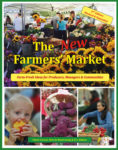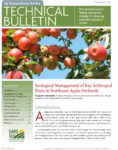Showing 71-80 of 193 results
Fitting Cover Crops in Vegetable Rotations
Ron Morse (Virginia Tech, emeritus) shares how to successfully fit cover crops into a vegetable rotation, including establishment methods, matching the right species to the right methods, recommended rotations and cash crop establishment.
Managing Cover Crops for Ecosystem Services in Vegetable Systems
Natalie Lounsbury (University of New Hampshire) discusses how to manage cover crops for such ecosystem services as: suppressing weeds, attracting pollinators, cycling nutrients, promoting biological diversity and controlling erosion.
Cover Crops: Current and Future Directions
This plenary discussion on current and future directions in cover crops features Greg Roth (Penn State, presenting on behalf of Scott Rushe, Seedway), Ramona Garner (USDA-NRCS Plant Materials Center) and Andrew Smyre (Perdue AgriBusiness). They discuss demand for cover crop seeds, the development of new varieties, and the agribusiness industry's role in supporting cover crops.
Evaluating and Improving Cover Crop Performance and Adoption
In this session, Sjoerd Duiker (Penn State University) discusses the possibility of adoption without government regulation or incentives, and Dean Hively (USGS) reviews the use of remote sensing to map cover crop performance, trends toward increasing wintertime ground cover and watershed-scale performance.
Cover Crops as Part of an Overall Nutrient Management System
In this session, Steven Mirsky (USDA-ARS) and Heather Darby (University of Vermont) discuss the role of cover crops in integrated fertility management and address cover crops in the context of forages, dairies, perennials and pastures, and rotating pasture to grain.
Managing Soil Health With Cover Crops: Beyond the Basics
In this session, leading experts dive deep into the soil-related benefits of cover crops. Ray Weil (University of Maryland) discusses the physical benefits; Michel Cavigelli (USDA-ARS) explains how cover crop management affects soil health; and Stuart Grandy (University of New Hampshire) discusses emerging concepts for harnessing microbes to build organic matter.
Cover Crop Field Tour Recap and Debrief
Attendees of the Cover Crops for Soil Health workshop have a short discussion reflecting on their tour of the long-term farming systems research project at the USDA Beltsville Agricultural Research Center in Maryland.
Farmer Panel on Cover Crops
Farmers Skip Paul (Rhode Island), Jeff Frey (Pennsylvania) and Perry Lilley (Maine) share their experiences with cover crops, including their motivation for using them, successes and challenges, factors that play into decision making around cover crops, and advice for ag service providers who want to encourage farmer adoption of this vital conservation practice.

The New Farmers' Market 2nd Edition
The New Farmers' Market - 2nd Edition - is a must-have resource for growers interested in selling their farm or market garden products through farmers' markets, as well as for market managers and city planners in starting, managing, and promoting a market.

Ecological Management of Key Arthropod Pests in Northeast Apple Orchards
Apples are an important crop in the Northeast, grown for both fresh market and processing. Growers have a challenging task managing insects, mites and diseases. By some estimates, growers may spend up to 25 percent of their production costs on pest management. This technical bulletin outlines strategies developed from SARE-funded projects in Massachusetts and Pennsylvania, including biologically based pest control, orchard architecture and development of materials approved for organic production.